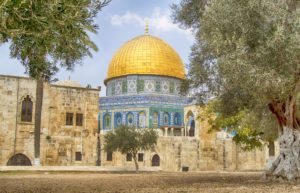The prophet (SAW) enters Makkah as a conqueror. Before that, some people thought that the prophet (SAW) would take revenge on the people because of the years of difficulty and oppression that the people of Makkah had put him through. In fact, while marching towards Makkah, one of the companions said, “Today is going to be the day of slaughter. Today, even the sanctity of the Ka’bah will not be upheld.” He was saying that the day the prophet (SAW) entered Makkah would be a day of revenge and they would butcher everyone, disregarding the sanctity of the Ka’bah. The prophet (SAW) was told about this comment and did not like this. He said, “No; today will be the day that we will show how merciful we are. This is the day in which Allah (SWT) will display how great the Ka’bah is. Today, Allah (SWT) is going to honor the Ka’bah.” Now, there are many incidents around the conquest of Makkah, but here is one of the interesting ones; some people who had been waging wars against the prophet (SAW) for years felt that there was no safety for them and that they had to get away. Amongst them was the son of Abu Jahl, Ikrima. Abu Jahl, as you might know, was one of the staunchest enemies of Islam and the prophet (SAW). He left no stone unturned in trying to harm the prophet (SAW) while he was in Makkah and in trying to wage wars after he had migrated. Ikrima was his son and partner in all that he used to do. From his youth, he saw his father abusing the prophet (SAW) and he played his role in trying to do the same. His father was referred to as in some narrations as the Fir’Awn, or pharaoh, of this Ummah, referring to the torment that the Fir’Awn put Musa (AS) through. So, Ikrima runs away from Makkah and flees towards the Yemen – the seaside. His wife, Ummu Hakim, comes to the prophet (SAW) and says, “O prophet of Allah, my husband has escaped and wants to flee somewhere using the ocean as his escape route. If I asked you to secure some safety for him, would you do so?” This is a man who has greatly and deeply hurt the prophet (SAW and his companions; but, when his wife came and asked for protection for her husband, the prophet (SAW) said, “Yes, I give my word that he will be safe and allowed to come back to Makkah. No one will harm him.”
Ummu Hakim sets out after him and travels until she reaches the port where Ikrima has just boarded the ship. Some narrations mention that as the ship was about to set sail, the water became very turbulent and the ship began to rock, so the captain of the ship told everyone, “Become pure or have ikhlas.” Ikrima said, “What are you talking about?” He said, “Say, ‘La ilaha illallah’.” Ikrima says, “This is what I have run away from and why I am using this ship. I am using this ship to run away from all of this and you are telling me to say that kalimah here? How can I do this?” As he is having this discussion, his wife shows up at the shore and she begins waving her hands and calling to him. He says, “Now I am trapped. I cannot leave with the ship as I have to deal with this people who are inviting me towards Islam, and on the shore, there is my wife, who if I return to Makkah with, I will not be safe.” She continued standing there calling to him, saying, “Do not destroy yourself. Come back, I have guaranteed safety for you. O Ikrima, I am coming to you from the kindest and most merciful of people, and he has guaranteed you his word and promised you safe passage back into Makkah and that you will not be harmed. Come back with me.” Ikrima finally accepts.
